Ruofei Zhu
Truncated Proximal Policy Optimization
Jun 18, 2025



Abstract:Recently, test-time scaling Large Language Models (LLMs) have demonstrated exceptional reasoning capabilities across scientific and professional tasks by generating long chains-of-thought (CoT). As a crucial component for developing these reasoning models, reinforcement learning (RL), exemplified by Proximal Policy Optimization (PPO) and its variants, allows models to learn through trial and error. However, PPO can be time-consuming due to its inherent on-policy nature, which is further exacerbated by increasing response lengths. In this work, we propose Truncated Proximal Policy Optimization (T-PPO), a novel extension to PPO that improves training efficiency by streamlining policy update and length-restricted response generation. T-PPO mitigates the issue of low hardware utilization, an inherent drawback of fully synchronized long-generation procedures, where resources often sit idle during the waiting periods for complete rollouts. Our contributions are two-folds. First, we propose Extended Generalized Advantage Estimation (EGAE) for advantage estimation derived from incomplete responses while maintaining the integrity of policy learning. Second, we devise a computationally optimized mechanism that allows for the independent optimization of the policy and value models. By selectively filtering prompt and truncated tokens, this mechanism reduces redundant computations and accelerates the training process without sacrificing convergence performance. We demonstrate the effectiveness and efficacy of T-PPO on AIME 2024 with a 32B base model. The experimental results show that T-PPO improves the training efficiency of reasoning LLMs by up to 2.5x and outperforms its existing competitors.
VAPO: Efficient and Reliable Reinforcement Learning for Advanced Reasoning Tasks
Apr 08, 2025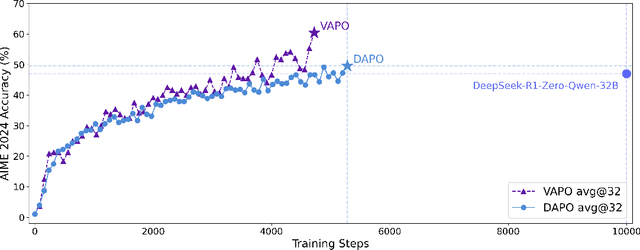
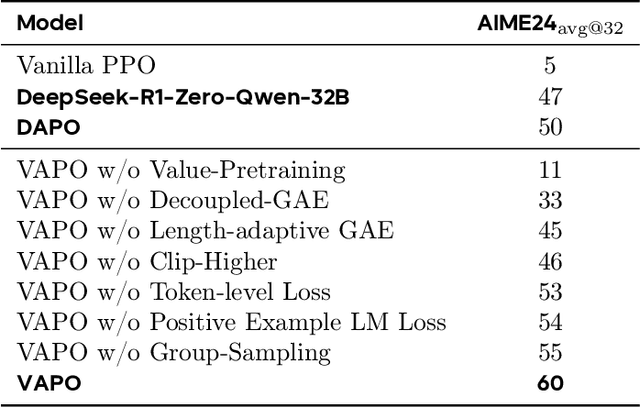
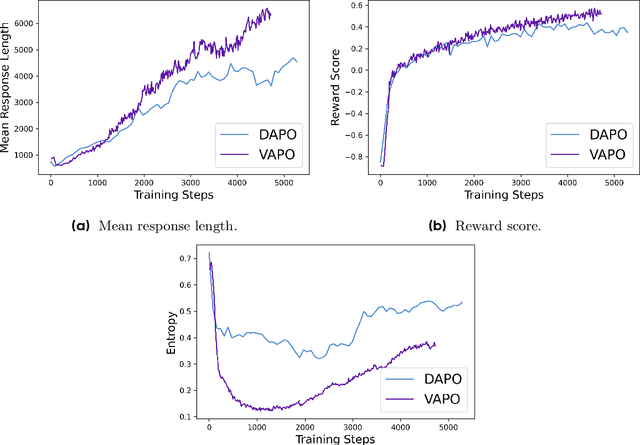
Abstract:We present VAPO, Value-based Augmented Proximal Policy Optimization framework for reasoning models., a novel framework tailored for reasoning models within the value-based paradigm. Benchmarked the AIME 2024 dataset, VAPO, built on the Qwen 32B pre-trained model, attains a state-of-the-art score of $\mathbf{60.4}$. In direct comparison under identical experimental settings, VAPO outperforms the previously reported results of DeepSeek-R1-Zero-Qwen-32B and DAPO by more than 10 points. The training process of VAPO stands out for its stability and efficiency. It reaches state-of-the-art performance within a mere 5,000 steps. Moreover, across multiple independent runs, no training crashes occur, underscoring its reliability. This research delves into long chain-of-thought (long-CoT) reasoning using a value-based reinforcement learning framework. We pinpoint three key challenges that plague value-based methods: value model bias, the presence of heterogeneous sequence lengths, and the sparsity of reward signals. Through systematic design, VAPO offers an integrated solution that effectively alleviates these challenges, enabling enhanced performance in long-CoT reasoning tasks.
Exploring Data Scaling Trends and Effects in Reinforcement Learning from Human Feedback
Mar 31, 2025Abstract:Reinforcement Learning from Human Feedback (RLHF) is crucial for aligning large language models with human preferences. While recent research has focused on algorithmic improvements, the importance of prompt-data construction has been overlooked. This paper addresses this gap by exploring data-driven bottlenecks in RLHF performance scaling, particularly reward hacking and decreasing response diversity. We introduce a hybrid reward system combining reasoning task verifiers (RTV) and a generative reward model (GenRM) to mitigate reward hacking. We also propose a novel prompt-selection method, Pre-PPO, to maintain response diversity and enhance learning effectiveness. Additionally, we find that prioritizing mathematical and coding tasks early in RLHF training significantly improves performance. Experiments across two model sizes validate our methods' effectiveness and scalability. Results show that RTV is most resistant to reward hacking, followed by GenRM with ground truth, and then GenRM with SFT Best-of-N responses. Our strategies enable rapid capture of subtle task-specific distinctions, leading to substantial improvements in overall RLHF performance. This work highlights the importance of careful data construction and provides practical methods to overcome performance barriers in RLHF.
DAPO: An Open-Source LLM Reinforcement Learning System at Scale
Mar 18, 2025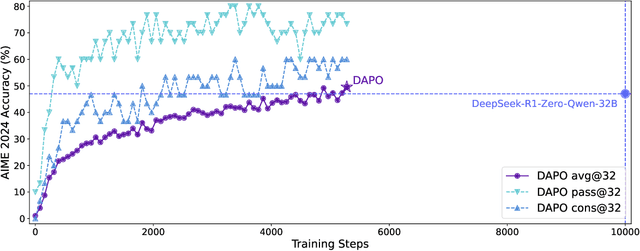
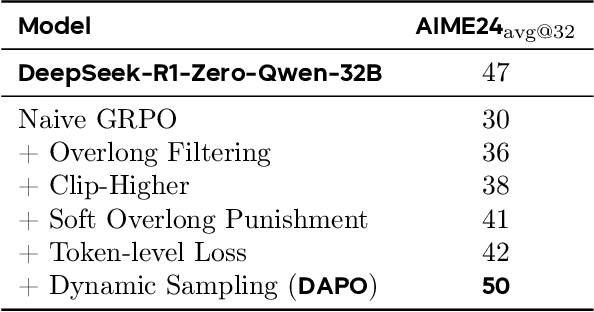
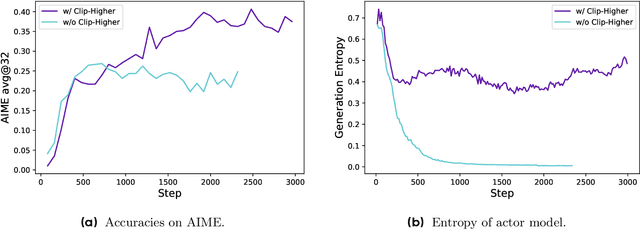
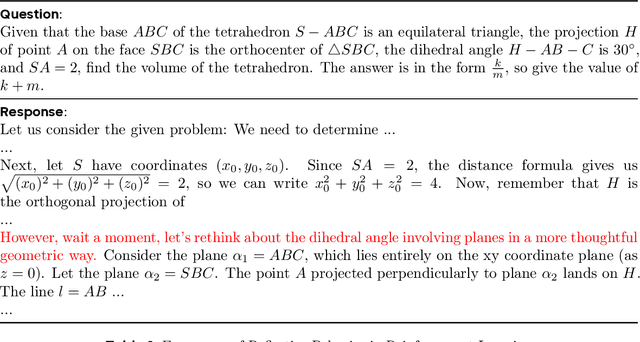
Abstract:Inference scaling empowers LLMs with unprecedented reasoning ability, with reinforcement learning as the core technique to elicit complex reasoning. However, key technical details of state-of-the-art reasoning LLMs are concealed (such as in OpenAI o1 blog and DeepSeek R1 technical report), thus the community still struggles to reproduce their RL training results. We propose the $\textbf{D}$ecoupled Clip and $\textbf{D}$ynamic s$\textbf{A}$mpling $\textbf{P}$olicy $\textbf{O}$ptimization ($\textbf{DAPO}$) algorithm, and fully open-source a state-of-the-art large-scale RL system that achieves 50 points on AIME 2024 using Qwen2.5-32B base model. Unlike previous works that withhold training details, we introduce four key techniques of our algorithm that make large-scale LLM RL a success. In addition, we open-source our training code, which is built on the verl framework, along with a carefully curated and processed dataset. These components of our open-source system enhance reproducibility and support future research in large-scale LLM RL.
What's Behind PPO's Collapse in Long-CoT? Value Optimization Holds the Secret
Mar 03, 2025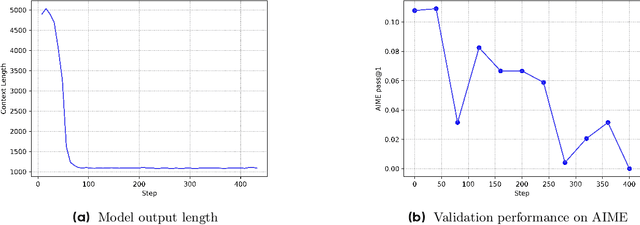

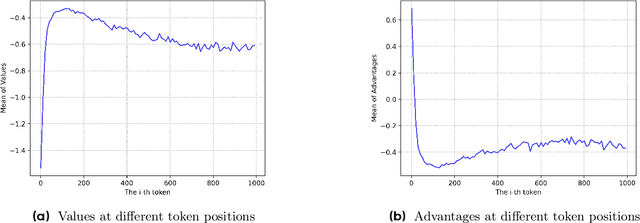

Abstract:Reinforcement learning (RL) is pivotal for enabling large language models (LLMs) to generate long chains of thought (CoT) for complex tasks like math and reasoning. However, Proximal Policy Optimization (PPO), effective in many RL scenarios, fails in long CoT tasks. This paper identifies that value initialization bias and reward signal decay are the root causes of PPO's failure. We propose Value-Calibrated PPO (VC-PPO) to address these issues. In VC-PPO, the value model is pretrained to tackle initialization bias, and the Generalized Advantage Estimation (GAE) computation is decoupled between the actor and critic to mitigate reward signal decay. Experiments on the American Invitational Mathematics Examination (AIME) show that VC-PPO significantly boosts PPO performance. Ablation studies show that techniques in VC-PPO are essential in enhancing PPO for long CoT tasks.
 Add to Chrome
Add to Chrome Add to Firefox
Add to Firefox Add to Edge
Add to Edge